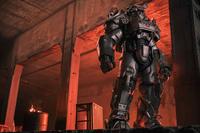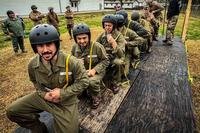
The Prophets of Smoked Meat by Daniel Vaughn
Photographs by Nicholas McWhirter
Ecco Press: An Anthony Bourdain Book
There's a long history of college-educated boys hitting the road in hopes of discovering the real America and Daniel Vaughn & Nicholas McWhirter's new book fits squarely into that tradition.
In their effort to document the Texas barbecue scene, the two made several trips over the course of a year and averaged over five barbecue meals a day on their journey. By their own count, they spend 35 days, drove 10,343 miles and ate at 186 BBQ joints.

Wilhite's Barbecue in Creedmoor uses butcher paper instead of plates.
Vaughn is an Ohio native who graduated from Tulane University before moving to Dallas to work as an architect in 2006. He freely admits he had little knowledge about smoked meat before then, but he soon got bit by the bug and soon started traveling around Texas to review restaurants for his own Full Custom Gospel BBQ blog and his @BBQSnob Twitter feed.
%embed6%
Anthony Bourdain discovered Vaughn's writing and invited him along when Bourdain visited Austin's astonishing Franklin Barbecue during the last series of No Reservations. Bourdain chose The Prophets of Smoked Meat as one of the first two books in his newly-launched publishing imprint. Right before this book was published, Vaughn quit his day job and joined the Texas Monthly as the world's first full-time barbecue critic.
Prophets is a travelog: Vaughn and McWhirter get in the car with a rough plan of places they want to visit but often stop off when they see a joint they've never heard of before. They ask people they meet along the way for recommendations and always hope their next meal will deliver something great. McWhirter's photographs document the experience and they're the key to the book's success. Vaughn can free-associate about each day's experiences because he's backed up with incredible images that let you in on what he's talking about. The book's layout is so spectacularly good that it's worth giving credit to designer Suet Ye Chong as the third creative force behind its success.

Franklin's Barbecue in Austin does things exactly the way Vaughn thinks they should.
Vaughn is absolutely specific and direct about his preferences: he thinks great Texas barbecue is brisket smoked slowly at low temperatures with oak wood in an offset smoker that doesn't expose the meat to direct heat. Even though he's 100% correct, that core belief doesn't prevent him from being curious and open-minded about the other styles he encounters on the trip: he tries (and often likes) the various styles of sausage around the state, the pit-cooked whole-cow's-head barbacoa style in South Texas, the direct-heat over-the-coals style in West Texas and even the chopped beef in East Texas.
Some restaurants get a couple of details pages, others are dismissed in a couple of sentences or less. There are a couple of dozen joints in the book that are fully participating in modern foodie culture. The owners know about and want to appeal to the army of bloggers and cable tv hosts that fuel the hipster dining world.
Most of the places in the book cater to their local, small-town markets and (by Vaughn's own description) seem puzzled by a guy with glasses and a barbecue t-shirt who brings along a photographer whose gear probably costs more than the furnishings of their entire restaurant. It would be great to get some of their takes on the situation, what they thought about Vaughn's horrified expression when fired up the microwave to heat up yesterday's brisket before serving.

In the 1930's, John Lomax rigged up his recording gear in the trunk so he could run it off the car batteries in areas without electricity. In 2012, Daniel Vaughn ate a lot of takeout meals off the hood of his car in the parking lot.
That's where Vaughn fits into the college boy tradition: his trip has echoes of John Lomax's quest to document and record "real" American folk music in the 1930's or the folk art dealers of the 1980's who "discovered" and promoted self-taught artists like Howard Finster and Thornton Dial. To his credit, Vaughn realizes that he's not preserving anything, just taking a snapshot of a particular moment in time. All the joints that close will be replaced soon enough and the traditions will continue to evolve.
Despite his "BBQSnob" Twitter handle, Vaughn is remarkably generous and might be too open-minded and inclusive to appeal to a lot of the new generation of restaurant mavens. This book doesn't pretend to be definitive: it's the story of one trip around the state and he repeatedly allows that he might be hitting a place on a bad day or notes that they arrived late in the day and that things might've been better when the meat first came off the smoker.
That said, proprietors of probably half the joints in this book won't want to display a copy in their restaurants. Then again, they didn't invite college boy and his fancy cameraman to their establishments, anyway.
%embed3%
Vaughn is especially good on the high-profile Central Texas places that I know best: he ably details the history of Lockhart's storied barbecue scene and does a great job of detailing the charms of Kreuz Market and Smitty's. He has a lot of great things to say about Black's, but the disappointing experience he describes in the book lines up with my last few visits to the place. (Apparently, Smitty's is having some issues: my last visit in March wasn't as good as usual and Smitty's got left off this year's Top 50 list in Texas Monthly).
Vaughn makes the world-famous Salt Lick sound like something more than a tourist trap designed to lure Austin conventioneers up for a short drive. His experience in the book makes it sound like they deserve another visit, but then he summarily dismissed the place when explaining why it's also not on the Top 50 list.
%embed1%
Tony Bourdain is down with Fat Matt's.
Of course, folks like what they like and there aren't many people willing to drive a couple of hours for a plate of barbecue. Bourdain did a fine job of mocking Atlanta barbecue snobs during a recent episode of The Layover. There's nothing wrong with Fat Matt's, but there were howls from the local food snobs when word got out he was filming there. Bourdain looks into the camera, explains that he realizes that the place doesn't meet the exacting standards of "real barbecue experts" and proceeds to tear into his plate of ribs and sides. (The full clip isn't available online, but the highlight above gives a nice indication of the foodie smackdown).
%embed4%
Vaughn holds up Aaron Franklin at Franklin's Barbecue in Austin as the pinnacle of barbecue (at least according to his definition). He's right. It's true that Aaron himself has a kind of media-friendly charisma that might suggest his fame is about him looking good on camera more than it is about his food. It's also true that most of the people waiting in his daily two-hour line wouldn't have a clue about whether the barbecue is any good once they sit down at the table. In spite of those facts, Aaron is consistently smoking the best brisket I've ever eaten and I've never experienced an off day in dozen times I've braved the line for a plate of brisket. Prophets really conveys just how hard it is to cook meat this way and all the challenges that go into maintaining the level of consistency that Franklin achieves.
Vaughn was obviously inspired by Lolis Eric Elie's 1996 classic Smokestack Lightning: Adventures in the Heart Barbecue Country, a book that featured a much broader geographical sampling but also collected recipes from many of the restaurants. There aren't many recipes in Prophets (they're collected in the back of the book with a handful of pitmaster profiles) and that's something that's confused a lot of the reviewers over at Amazon. It's a book about driving and eating: you won't find any tips for improving your Weber or Big Green Egg techniques. (Bourdain's other new title, the well-received Smoke and Pickles: Recipes and Stories from a New Southern Kitchen by Edward Lee, seems to have a more traditional recipe-and-anecdote cooking book format).
Writing about barbecue is like writing about religion or guns: no matter what you say, you're absolutely 100% certain to piss somebody off. Daniel Vaughn is enthusiastic, opinionated and usually pretty generous. He committed an outrageous amount of time to this investigation. If you're visiting Texas, there are a lot of suggestions about where you should eat and a lot of ideas that will provoke a lot of discussion and debate after you've finished wiping the meat off your chin.
%embed2%




